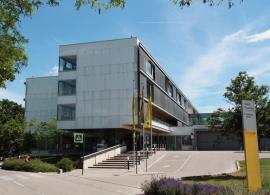New Research Centre for Transitional Psychiatry in Tulln
Research into the psyche of young people between the ages of 15 and 25 is getting an innovative home ath the university hospital in Tulln. It follows the scientific work of the DOT research group.

Krems - 80% of all mental illnesses occur for the first time in adolescence. For affected young people, however, there is often a gap in care, as neither the offers of child psychiatry nor those of adult psychiatry seem adequate or attractive. This has an impact on the further course of life and also on society, since untreated mental problems do not allow those affected to reach their full potential, so that losses in everyday life are the consequence. This is exactly where the research group DOT ("The Open Door") of the Ludwig Boltzmann Society (LBG) and the Karl Landsteiner Private University (KL) come in and lay the foundation for a research centre for transitional psychiatry that is currently unique in Austria.
Research centre with an open innovation in science approach
In the Research Centre for Transitional Psychiatry, research on understanding mental development in adolescence, prevention of mental illness and interventions will be taken up by DOT and continued in the spirit of the Open Innovation in Science approach. Stakeholders are involved in all research steps, from conceptualisation to evaluation and interpretation of data to dissemination of results, virtually as co-researchers in the process. This also includes the establishment of a clinical research area. The second Tulln workshop "Development must not take a break!" in February 2022 will mark the start of this process. Patients, relatives and psychosocial care staff will discuss together what good transitional psychiatry needs.
DOT was developed in a participatory process as part of an Ideas Lab and was established by KL and LBG in Krems in 2018. Since then, the international and interdisciplinary research group has been working in Lower Austria according to Open Innovation in Science principles on topics of mental health promotion for young people, prevention of mental illness and early intervention. Following this, DOT has built up a broad network of stakeholders ranging from the school system and educational institutions to psychosocial care facilities, associations and the young people themselves. "I am pleased that this important topic will be carried forward in the new research centre. It is very much in the spirit of our Open Innovation in Science approach to continue to invite as many stakeholders as possible to participate and work on the common goal," says Beate Schrank, head of the DOT research group.




